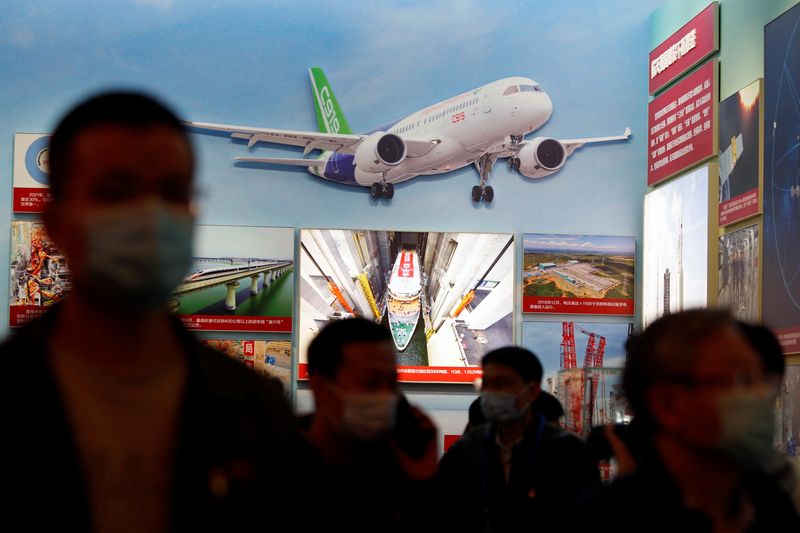By Sophie Yu and Brenda Goh
BEIJING (Reuters) -Chinese planemaker Commercial Aircraft Corporation of China (COMAC) said it had secured 330 orders for its homegrown C919 narrowbody and ARJ21 regional jets, and raised its 20-year aircraft demand forecast at the country's biggest air show.
China Development Bank Leasing, ICBC Leasing, CMB Financial Leasing, BOCOM Leasing, CCB Financial Leasing, SPDB Financial Leasing and Jiangsu Financial Leasing on Tuesday signed orders for a combined 300 C919s and 30 ARJ21s at Airshow China in the southern city of Zhuhai, COMAC said in a statement on Wednesday.
As with previous announcements, it was not immediately clear how many were firm orders or expressions of interest, and no delivery dates were provided.
Before the latest deals, there had been 815 orders for the C919 from 28 customers, according to COMAC's website. But China Eastern Airlines (NYSE:CEA) is the only customer that has announced a firm delivery schedule. It expects to receive its first plane in December and another four next year.
The C919 is China's rival to the popular Airbus A320neo and Boeing (NYSE:BA) 737 MAX narrowbody jet families, as the country looks to become more self-sufficient amid growing tensions with the West over trade and the status of Chinese-claimed, self-governed Taiwan.
COMAC said on Tuesday that China would need 9,284 new aircraft over the next 20 years to meet market demand, 200 more than in its forecast last year.
The Chinese plane maker's forecast is higher than Boeing's, which predicted last month that China would require 8,485 new planes in the next 20 years.
The U.S manufacturer forecast China would need 6,370 single-aisle airplanes to support its growing network of international and domestic routes in that time, while COMAC said that 6,896 such planes would be needed.
Boeing has been all but shut out of orders in the world's biggest market for new aircraft since 2017 amid U.S.-China trade tensions, though Chinese airlines have this year agreed to buy more than 300 Airbus narrowbody planes.
COMAC and Boeing on Wednesday said they would expand cooperation in the COMAC-Boeing Sustainable Aviation Technology Centre, which was established in 2012 to improve fuel efficiency and reduce carbon emissions, according to Boeing's social media account on Weibo (NASDAQ:WB).
The deal comes as Boeing remains determined to maintain a strong presence in China, even though it no longer factors the country into its financial forecasts because the country will not accept deliveries of new MAX planes.

"Not having China matters a lot to us. We want them," Boeing Chief Executive David Calhoun told investors last week. "We are not turning our back on them in any way, shape or form and won't."
State-owned newspaper Global Times last month said Boeing was "an epitome of U.S. companies that have experienced a backlash due to the politicisation of economic and trade issues by the U.S."